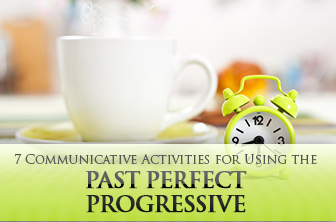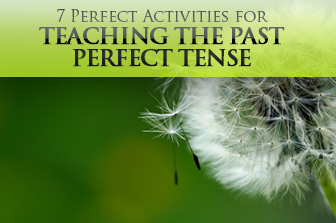7 Communicative Activities for Using the Past Perfect Progressive



Write several past times on small slips of paper and then put them in a hat. Have each student draw a past time and then state something he or she had already done by that time using the past perfect tense. Each student should include ‘already’ in his answers. For example, ‘I had already applied to school in February’.
What things have your students done recently? Have they taken trips or seen certain movies? As a class, brainstorm a list of activities they have done using the simple past and time references. Then, each person should take turns telling the class something he completed before one of the listed events. They should use the past perfect for their own event, and a subordinate clause starting with ‘before’ for the event in the simple past. For example, ‘I had seen the movie before you finished the book’.
Using the same events from the last activity, have your students restate their sentences using a subordinate clause starting with after. For example, ‘You finished the book after I had seen the movie’.
Many ESL students find that travelling overseas to study brings many different cultural experiences. Ask your students to share some things they had never done before travelling overseas for their English studies. They should use the past perfect in the negative form. For example, ‘I had never eaten pizza before I came to the U.S’.
What had your students just done at each hour of the day yesterday? Have each person write out some things that he had just done for each hour during the day. For example, ‘I had just woken up at 6 a.m. I had just finished my breakfast at 7 a.m’.
When using reported speech, verb tenses change. Any verbs expressed in the simple past in the original statement will change to the past perfect in the reported speech. Arrange your students in a circle and have one person express and action in the simple past. For example, ‘I came to class today’. The next person in the circle must then convert that sentence to reported speech. ‘She said that she had come to class today’. That second person then makes a past statement, and the next person in the circle changes it to reported speech. Continue until the first person converts the last students past statement to reported speech.
For conditional sentences expressing unreal past situations, the past perfect is used in the if-clause. The main clause then uses ‘would’ as the auxiliary verb. Have each student write three true sentences about herself using the simple past. Then, have her write a conditional sentence changing each true sentence into an unreal if-clause. For example, if she writes ‘I studied for the test’, she might write the following conditional: ‘If I had not studied for the test, I would have failed’.